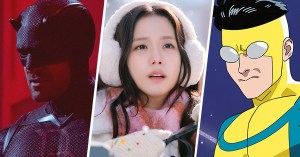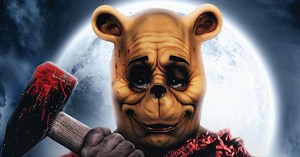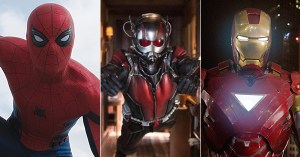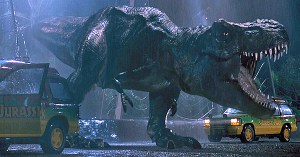An Oral History of Glass with M. Night Shyamalan and the Cast
The director and cast members Samuel L. Jackson, James McAvoy, and Sarah Paulson talk expanding the Unbreakable universe and going full superhero movie.
Split ended with what was arguably M. Night Shyamalan’s biggest twist yet: Unbreakable‘s David Dunn (Bruce Willis) sitting at a diner counter and watching TV. It was a seemingly innocuous moment that signaled so much for fans – there was a Shyamalan universe, and it was full of larger-than-life comic-book villains and heroes. When news broke in April 2017 that Shyamalan would be making a sequel to Unbreakable and Split that would bring Dunn, The Horde (James McAvoy), and Elijah Price (Samuel L. Jackson) together – and that it would be an all-out superhero movie (albeit one set in a psychiatric hospital) – well, fans up and lost their s–t. Casting announcements (Anya Taylor-Joy, Sarah Paulson), trailers, and posters have only heightened levels of anticipation for the film. The director, riding high on all that excitement and in the middle of a huge career comeback, sat down with Rotten Tomatoes to speak about how Glass came together and why now was the perfect time to make it. We also spoke with Jackson, McAvoy, and Paulson – in her Dr. Ellie Staple, our super Philadelphians meet their match – about working with “Night” and each other on the film, and how the director has expanded his Shyamalaniverse.
What follows is a history of Glass (2019), and reflection upon it, drawn from sit-down interviews with M. Night Shyamalan, Samuel L. Jackson, James McAvoy, and Sarah Paulson.
ALSO WATCH: An Oral History of Unbreakable | An Oral History of Split
“My instincts to be dark are good now. They’re really good.”
M. Night Shyamalan: First of all, [Glass] is tonally in the pocket right now, whereas Unbreakable was a little too dark for its time, a little too somber, edgy. But that kind of dark filmmaking – because of Fincher and Nolan and Aronofsky – has become the center. So my instincts to be dark are good now. They’re really good. We’re not coming off the ’80s or ’90s where we had more of that straight family feel-good feeling as our center. It’s a darker center now. And this type of story I’m doing, and the way I’m telling it, fits this kind of irreverent tone of: Is this funny? Is this scary? This is inappropriate! That’s a beautiful tone now. And, obviously, deconstructing a comic book movie on screen at the end of 15-16 years of comic book movies… finding a fresh take on comic books is something audiences are just really, really ready for.

(Photo by © Universal Pictures)
“Night got banged around between Unbreakable and Split: it’s one of those things that you either learn from, or you keep trying to impose your will on something that’s just not gonna bend to you.”
Samuel L. Jackson: When we got [Shyamalan, during shooting for Unbreakable], he was fresh off of the success of “I see dead people.” And all of a sudden, he got a little nicked with [Unbreakable], but the movie has an enduring kind of cult following that’s amazing. He got banged around between those movies and Split, and it’s one of those things that you either learn from, or you keep trying to impose your will on something that’s just not gonna bend to you. I think he’s learned how to nuance what he does with what is sort of popular in terms of what storytelling actually is.
“I take the process very seriously and the actors take it very seriously on my movies.”
Shyamalan: It’s overwhelming to be on set and have these world-class actors, who are so iconic in cinema, come and play these characters. But because I’m the writer/director, there’s a very specific thing I’m trying to get, and I always talk to them in terms of that character. We’re talking about Elijah. We’re talking about Kevin or Patricia or David. And I’m saying, “David thinks like this. I don’t think he would go because David would feel like that. The way you did that performance made David too angry.” And we’re all conjuring this thing to life, you know – the actors and I. And I take that process very seriously and they take it very seriously on my movies.

(Photo by © Universal Pictures)
“Elijah has a very good idea of what he wants to do with these guys.”
Jackson: It’s Kind of wondrous for me to have a [character] 14 years later whose kinda… everybody thinks one thing’s going on with him, but he has his own agenda, as usual. He’s been quietly studying, plotting, planning, paying attention to the world outside in interesting ways so he knows what David is doing. He knows who Mr. Crumb is, so when they show up, he has a very good idea of what he wants to do with these guys. Elijah is as sharp as he’s always been, and having fun playing with the people inside that place.
“Bruce Willis has been on my TV, in my theaters, for all that time being this total icon.”
James McAvoy: I’ve been watching Bruce Willis since Moonlighting, you know? He’s been on my TV, in my theaters, for all that time being this… just hero, this total icon. And getting to work with that, and that sort of iconic, statuesque quality that he has where he does so little and it’s just so powerful? It was amazing to be around. Then marry that with the kind of mayhem that I’m doing, and all the kind of cartwheels and back-flips and all that kind of stuff. And then, on the other side of that, you’ve got Samuel L Jackson just nailing everything with a kind of pinpoint precision and verbal dexterity, which is amazing to be around. And then on top of that you get Sarah Paulson, who’s got this amazingly emotional expressive vulnerability throughout the whole thing. She’s potentially the antagonist, and she’s playing that with vulnerability. [There’s] so much interesting work and so much different work coming from the four actors that were in those therapy scenes, that were in those moments, it’s amazing to be part of that. It’s a privilege to be a part of that.

(Photo by @ Universal Pictures)
“For Glass, we fleshed out every single character – and there’s 24 with The Beast. We shot every single one.”
Shyamalan: In Split, James played… I think on camera he played nine characters and we referenced the 23 characters on the computer screen. And for Glass, we fleshed out every single character – and there’s 24 with The Beast. We fleshed out every single one, we shot every single one, and not all of them made it into the movie, but 20 did. So, he does 20 personalities in Glass, which is astonishing. I was trying so hard to get all 23 in, but I couldn’t do it.
McAvoy: There’s one [new] character actually who I loved. Was it Percival? Can’t remember his name now; it’s been a while, sorry guys. He’s only in it for like two seconds but he sees the world from a third person, as if he’s narrating in the third person, and that’s how he makes sense of the world. [The Beast]’s evolved a bit emotionally, quite well. And, you know, he’s got a world view and he’s got a plan. Beast is definitely trying to accomplish something. He trying to hand the world to those who’ve been abused and those who’ve been hurt. But I think that he thought that he would have an instant army of people who’ve had a tough time, and it’s not really working out like that.
“Sarah was the perfect person to lock in the room and see if Sam could out-talk her or she could out-think Bruce.”
Shyamalan: I wanted to make sure that in each movie there was a powerful new language; a powerful new element in it. And in Glass, the new element is Sarah Paulson. I was thinking about who could be the psychiatrist who could spar with these guys, who could challenge these guys both as actors but on camera? [Someone who had] the energy. The kind of buoyancy and entertainment value. The intelligence. The craft. For me, my action sequences in my comic book movie are the dialogue scenes. They’re kind of like the sizzle of how they’re fighting each other. And so, who could battle them all? And I felt like Sarah was the perfect person to lock her in the room and see if Sam could out-talk her or she could out-think Bruce.

(Photo by @ Universal Pictures)
“I was like, ‘What? You mean like M. Night Shyamalan, Shyamalan?’”
Sarah Paulson: I was approached for the role after Night watched The People vs. O.J. Simpson, and I guess liked my performance. But it was almost a year later, and I got a phone call from my agent saying, “M. Night Shyamalan is interested in you for his movie.” I was like, “What? You mean like M. Night Shyamalan, Shyamalan?” She said, “Yes. Yes.” I was shooting American Horror Story at the time, and I didn’t have a single day off, and he very kindly came to my trailer. We had a meeting on my lunch break. We talked for an hour and seemed to very much hit it off. But I had no idea if it was going to [happen]. This was all without my having seen a script at all. I think when he finally did offer me the part, and it took a while, I got the script delivered to me from a young man with a baseball hat and a backpack knocking on the door of the hotel I was staying in in New York. It was like, “Psst. You got the role.” I opened the door, and he was like, “Okay,” and he handed it to me. Then, when he came to give me a new draft, he handed me the new script, and he was like, “I need you to get the other one.” So it was very serious, but I basically said, “Yes.” The long, really winding road I just went on really doesn’t matter. The point is, I said, “yes” to it without having read it. That’s how badly I wanted to do it.
“Nothing you see up there is by happenstance. It’s really, really premeditated.”
Paulson: Working with Night was really extraordinary, mostly because it felt like being with a member of my own family – and by my own family I mean me. I’m an incredibly controlling, exacting kind of person by nature, and to me it’s all in the details. I really love that kind of way of working. So for me it was very relaxing actually to be working with someone who had something so specific in mind that it wasn’t up to me to come up with three different ways to play the scene. Night knew exactly how he wanted, and what he needed, and what he was going to be shooting. I remember shooting a scene one day where I was delivering a piece of information to another character. It was a long speech, and he shot it starting on my face, and then hinged the camera over to the person I was speaking to, and then stayed with that character the entire time. I kept thinking like, “Dude, this is a big speech that I have, and I think you should be right here.” I asked him, “What was the thinking,” and he said, “The audience is going to care. They are going to want to see the person to whom you’re delivering this information, what their response is… they want to see how it affects this person.” It was just this revelation for me in terms of filmmaking in general and point of view, and he has that. It’s that thing of Night knowing exactly what the audience wants, and it’s all purposeful. Nothing you see up there is by happenstance. It’s really, really premeditated, and carefully, carefully thought-out from a story perspective. I have nothing but respect for that.
“I feel like the audience is ready for something different.”
Shyamalan: It’s very exciting. It’s a weird experience for me because normally I make movies [in which] nobody knows what they’re gonna see. They’ve never met these characters before. We’re all gonna learn a new language together. But they do know these characters, most of them. So, it’s a really interesting relationship that this movie holds with regard to my relationship and the audience, which I take very, very seriously. I’m really, really excited because I feel like they’re ready for something different – and it certainly is that.






